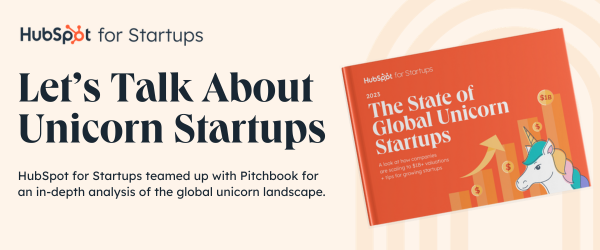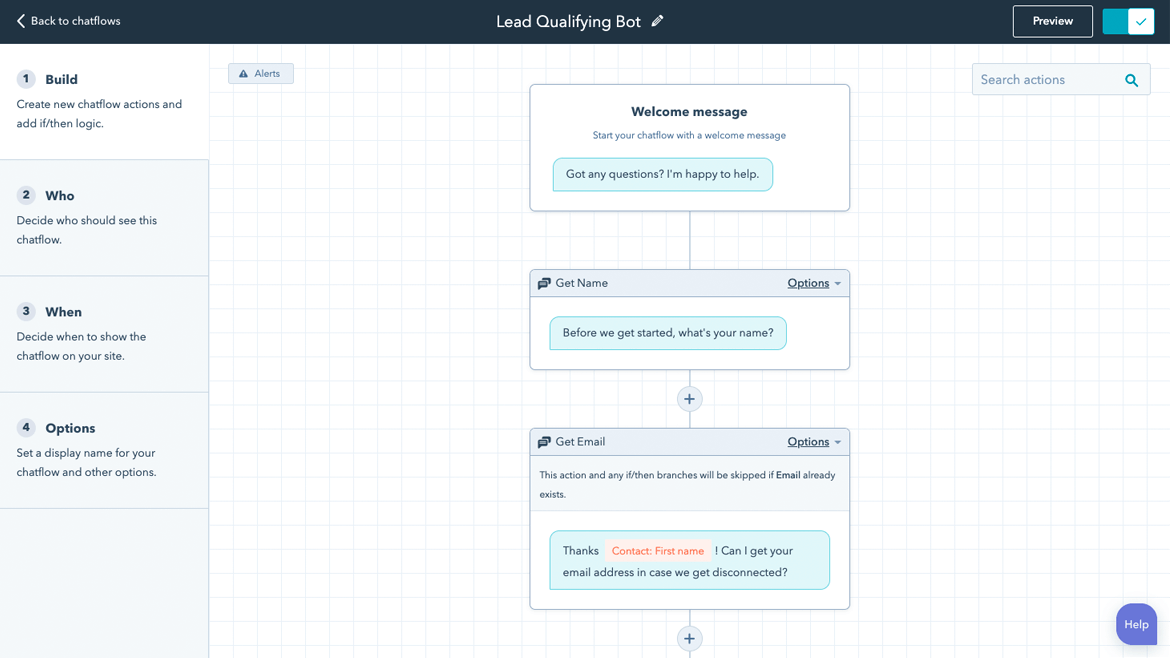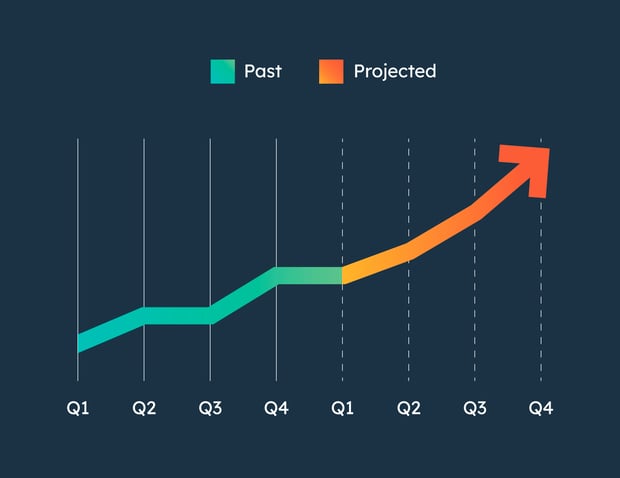Introduction
It’s as hard as ever for startups to make it. Not only is there competition from all sides, but artificial intelligence has also been thrown into the mix. Where you were once just competing with humans, now you have AI to deal with as well, and this is accelerating everything. You now have to work and adapt faster than ever before to make sure that your company makes it.
What does startup sales growth look like in 2024?
Startup business strategies are changing. What worked to attract investors pre-2020 isn’t working as well anymore. The investment landscape is transforming — 2021 saw the most new unicorns of all time, followed by a slowdown in the following years. Investors are increasingly interested in slow, steady startup growth and teams with efficient systems that are using the latest technology like artificial intelligence (AI) sales tools to stay lean. Overall investments are down, but those rounds of funding coming through, like OpenAI’s $10B from Microsoft, come with high expectations for their recipients.
For startups with investment backing, AI sales automation can help identify strong prospects, cut down on manual effort from sales reps, and help nail down the right sales pitch for every potential customer.
Challenges for Investment-backed startups
The number one challenge for startups is getting their hands on money. Investment-backed startups are currently dealing with challenges like a more competitive, conservative funding environment, which has been coined a “funding winter.” There was a 48% decrease in venture-backed investments in the first half of 2023. And, at the moment, only about a fifth of unicorns in Europe, private companies valued at over $1B, are profitable.

Only about 10% of startups are successful. At a time when inflation is at a recent high, it can be hard for startups to secure funding without a strong case that their product or solution has staying power.
If your startup is already investment-backed, you might feel that you’re already in the clear. Unfortunately, though, there are plenty of other hurdles that you’ll face before you’re successfully in the market with a popular product. The competition is constantly pushing to outdo you or take over the same market share that you’re targeting. It’s a rapidly changing landscape out there, and you need to be able to manage your time and funds effectively so that you can roll out when you need to.
Planning often falls to the wayside in this rushed environment, but it has a critical role to play. You need to attract the right staff, address skills shortages, focus on development, and create a durable business plan that’s flexible and responsive to change.
One of startups' biggest challenges is not focusing enough on sales and marketing. However, there’s little use in creating an outstanding product if you don’t get people to use it. That’s why development-led organizations need to collaborate with sales and marketing professionals effectively and use every tool available, including AI, to get their products to market and make their businesses flourish.
How do you scale a startup business efficiently?
Funded startups using effective strategies to improve sales are leaning heavily into automation, data-driven decision-making, and relationship-building (at scale). Some of the ways startups are scaling more efficiently are:
Why do venture-backed startups fail?
About 75% of venture-backed startups fail and don’t return any cash to investors. Why? Elizabeth Pollman, law professor at the University of Pennsylvania, shares that funded startups fail because they:
- Run out of cash
- Face issues within the team
- Run into “shortcomings” with the development of the product
- Use the wrong business model
- Don’t have a strong market need
- Never get enough recognition
To combat the recent venture-backed startup slump that’s a response to the hot streak of 2021, startups are building more agile sales processes into their growth plans and focusing on profitability, not just being the most talked-about startup on the block.
Benefits of Leveraging AI for Startup Sales
When your startup sales team isn’t spending their time manually logging data, identifying top prospects, or crafting personalized emails, they can build deeper relationships with the right prospects and bring in recurring revenue. Recent HubSpot research on AI in sales found that:
- 78% of sales professionals believe that AI helps them spend more time on more critical work.
- 73% of sales professionals agree that AI tools help them pull insights from data they wouldn’t otherwise be able to find.
- 65% of sales professionals say that AI helps them understand their customers better.
- 69% of sales professionals feel that AI helps them personalize the customer experience.
- 70% of sales pros feel that AI sales tools make them more productive at work.
The same report found that sales teams are using AI to automate manual tasks, uncover insights from data, and generate outreach messages.
Startups Using AI in Sales and Marketing GTM Strategies are Scaling Faster
In Australia, 78% of GTM teams already report using AI. The early adopters are made up of younger businesses and established teams. GTM teams using AI feel that it’s a “game-changer” in increasing efficiency, productivity, and revenue. McKinsey research found that high-performing orgs are more likely to spend more of their budget on AI tools.
“[AI has the potential] to change processes radically, to get rid of tedium, to improve the time that our people have to do higher-value tasks, and create new value for our teams and our customers,” shared Stephen Scheeler, CEO and co-founder of Omniscient Neurotechnology.
Mark Sue, CFO and Startup Advisor, explained that SaaS startups using AI in GTM are automating and streamlining their sales processes, equipping sales teams with AI tools, shortening their ramp times and accelerating sales, and training new reps to improve their conversations.
7 Ways to Use AI Sales Tools to Increase Startup Sales
Here’s how investor-backed startups can use AI tools throughout the sales funnel to bring in more leads, convert them into sales, and develop deeper relationships with customers.
Use AI sales automation to set up high-performing outreach templates and email sequences
While some on your sales team might have excellent written communication skills, others can find this to be a struggle. Getting the tone and content of an email right wins you customers. On the other hand, unpolished, error-filled messages turn people away fast.
Using AI for email marketing can streamline this process and ensure quality output, every time. HubSpot’s AI Email Writer can help sales teams increase response rates by generating personalized emails for prospects or leads, speed up outreach with sales email templates, and track the effectiveness of different messaging channels with reporting.
Set up AI-powered sales bots to answer prospect questions and qualify leads
Sometimes, winning a deal is all about improving the customer experience and being the first one to respond. A HubSpot survey found that 61% of customer service professionals think that most reps will use AI or automation in their role in 2024.
HubSpot’s AI Chatbot Builder is a Chat GPT-based tool that can communicate with anyone visiting your website who’s looking to have their questions answered quickly.
Here’s how it works
- AI bot receives a query from the person browsing.
- The AI sales bot scours the site to find the best answer or asks follow up questions.
- The chatbot provides the best answer to the person browsing and directs them to next steps.
Suddenly, your prospects and customers can get help 24/7, making them feel looked after and improving their loyalty. When it comes to customer service, this is one of the most important AI sales tools available.
AI sales bots can also collect data from prospects to help your team more automatically qualify prospects. See how else chatbots can revolutionize the sales process.

Improve sales enablement with conversational AI
Conversational AI, much like AI sales bots, can take away manual work from sales teams while providing a better experience for the prospect or customer. When it comes to cross-selling, upselling, and lead nurturing during the sales enablement process, conversational AI tools can quickly surface answers for customers within their account or in place of a quick call to their account manager.
Create personalized sales pitches with generative AI
Pitching your business and its benefits needs to be tailored for every prospect or customer and their specific needs at the moment of your conversation. And for startups, pitch decks can change up by the week as you develop and refine your product. Use generative AI and startup pitch deck templates along with contact data from your startup’s CRM to craft a compelling outreach message for every contact, faster.

Plan ahead with AI sales forecasting and data analysis
To ensure that your GTM strategy is on track, you need reporting within your sales and marketing departments that tell you what’s working and what needs
to change.
With HubSpot’s AI reporting assistant, generating reports is more accessible. It can:
- Help you manage data and present it in easy-to-understand ways.
- Change visualizations and data parameters on the fly to get the figures your team needs to see immediately.
- Generate names and descriptions to make your reports more accessible.
For early-stage startups, sales ops resources are limited, so AI-powered data analysis can give you more sophisticated insights that would otherwise be too costly.
Train your startup sales team and analyze calls and communications
AI sales tools like the Gong integration with HubSpot take recordings of your sales calls, automatically analyzes them with AI, and provides a look into where your team can improve sales performance. This integration automatically pulls sales calls into contact profiles in the HubSpot CRM.
Optimize your startup’s pricing strategy with AI tools
One of the biggest challenges startups face is optimizing their pricing strategy. You need to reach the right audience, figure out the right upselling points, and consider a freemium model versus a free trial. Will you offer seat-based pricing or unlimited users per tier? It’s a lot to consider and the only way to determine the smartest possible pricing is to test. Accenture is an example of a dynamic pricing tool powered by AI that can improve startup profitability and experiment with pricing in real-time. Many startups are now opting to bring on AI revenue management tools early on, iterating along the way.
Revamp Your Startup Sales Funnel With AI
Whether you’re a founder at a Series B AI startup or the first BDR at a bootstrapped SaaS startup, you know that you need to always be selling. AI sales automation tools help to serve as your second set of hands to get back to customers and bring in new business.
Get inspired and read what the fastest-growing startups are doing to scale sales in The State of Global Unicorn Startups Report.







